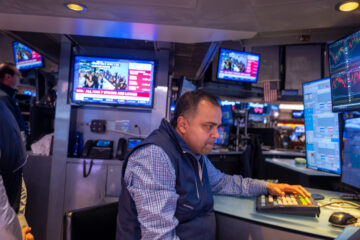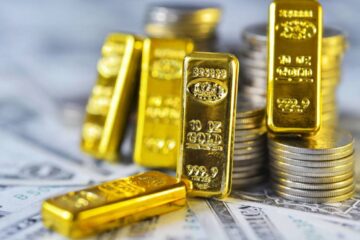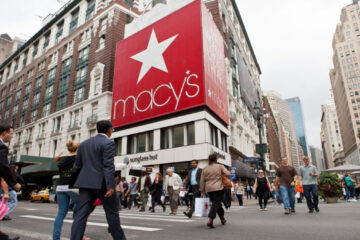Yeah, so about that whole Chinese tariff thing . . .
It seems like it was only yesterday that we were all wondering what to do in light of President Donald Trump’s plans to slap Chinese goods imported to the U.S. with 145% tariff rate.
💵💰Don’t miss the move: Subscribe to TheStreet’s free daily newsletter 💰
Administration officials said that the tariffs on China would encourage the manufacturing of electronics in the U.S.
But the plan caused all kinds of dismay among consumers who love their electronic devices and in the tech sector, which relies heavily on China for manufacturing, supply chains and market access.
Apple (AAPL) was in a particularly bad spot, according to Wedbush analyst Dan Ives, who said the computer giant was “in the eye of this storm,” since 90% of iPhones are produced and assembled in China and the company “has no choice but to price iPhones at $2k+ if these tariffs stick for more than a few weeks.”
President Donald Trump explaining his tariff plan.
BRENDAN SMIALOWSKI/Getty Images
Analyst: tech industry has loud voice
Come to think of it, it was just yesterday — April 11 — when Ives talked about “the self-inflicted uncertainty from the China tariffs” that created “mass uncertainty not seen since Covid, created a price shock that will impact the daily lives of US consumers with no end in sight, and unfortunately ripped the hearts and lungs out of the US Big Tech supply chain in the process with no minimal to no alternatives.”
But what a difference a day makes, as the song says, because new guidance published that evening by U.S. Customs and Border Protection said that smartphones, laptop computers, memory chips and other electronics will be exempt from the tariffs, Bloomberg reported.
More Tech Stocks:
Top analyst revisits Tesla stock price target as Q1 earnings loomGoogle’s Waymo is planning a move that’s downright creepyAnalyst reboots Apple stock price target after tariff meltdown
In addition, machines used to create semiconductors, flat screen TVs, tablets and desktop computers will also be exempt from Trump’s 125% China tariff and his 10% baseline tariff on countries around the world.
Related: Jamie Dimon sends candid message on economy, stocks
“The US tech industry has a loud voice and despite initial strong pushback against exemptions within the White House the reality of the situation was finally recognized in the Beltway,” Ives said in yet another research note published on Saturday. “There is still clear uncertainty and volatility ahead with these China negotiations.”
Trump hinted at exemptions Friday night on Air Force One with reporters, according to The Wall Street Journal. And it was guessed at by many analysts earlier in the day, according to Investors Business Daily.
“There could be a couple of exceptions for obvious reasons, but I would say 10% is a floor,” Trump said.
Apple, in fact, rose 4.1% to $198.15 on Friday. Nvidia (NVDA) , another winner from this decision, was up 3.2% to $110.93.
Other tariffs will still apply to electronics and smartphones. The Trump administration had applied a tariff of 20% on Chinese goods earlier this year for what the administration said was the country’s role in the fentanyl trade.
Veteran investor says expect uncertainty
This does not means all is clear for Apple and Nvidia. “There is still clear uncertainty and volatility ahead with these China negotiations,” Ives said.
And it’s just in times like these that James “Rev Shark” DePorre reminds us of the Pareto Principle, which says that 80% of the time, you won’t make much money in the stock market.
Related: Analysts rework Apple stock price target amid tariff troubles
“Embrace that fact rather than fight it,” he said in his latest TheStreet Pro column. “The one great certainty of all markets is cycles of ups and downs. Every market, from cryptocurrencies to tulip bulbs to stocks, goes through boom and bust phases.”
This is inevitable, he said, because of the ups and downs of human emotions.
“It is one thing that will never change,” DePorre noted.
The cyclical nature of markets goes hand-in-hand with the Pareto Principle, which is also known as the 80-20 rule, the self-taught stock trader explained. The rule states that roughly 80% of the effect of something comes from 20% of the causes.
“Twenty percent of the time, your efforts will produce the desired results, while 80% of the time, you are spinning your wheels and not making any money,”said DePorre, the founder of Shark Investing.
Now the problem with cycles and the Pareto Principle is that we never know when things will turn, he explained, adding, “all we can do is stay ready to react when the good times start to roll.”
Related: Japanese carmaker takes drastic action amid U.S. trade war
“The best way to deal with the stress and anxiety of difficult markets like the one we are currently experiencing is to simply recognize that this is one of those periods when we aren’t going to make money,” DePorre said. “The main reason that most folks feel so frustrated is that they are fighting the fact that the market is not producing good opportunities.”
Remember, he said, the nature of the market beast is extremely difficult at times.
“Embrace that fact and focus on preparing for the 20% of the time when you will rack up big gains,” DePorre said.
Related: Veteran fund manager who forecast S&P 500 crash unveils surprising update


